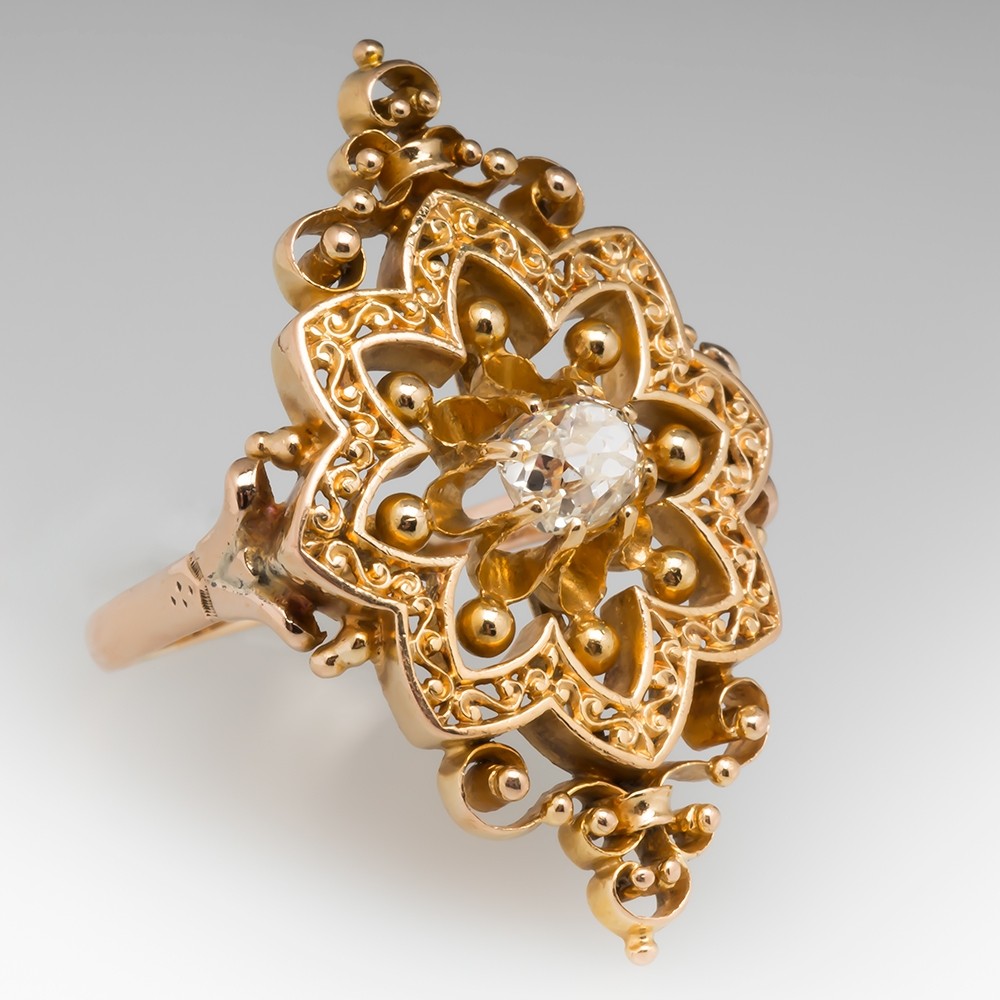Posted in: World Wedding Customs
 This ornate gold ring is an excellent example of an African courtship gift ©2018 EraGem Jewelry
African courtship and engagement begin with complex pre-wedding rituals. Family harmony is central to the indigenous tribal villages scattered throughout the land. Therefore, many of these African courtship customs involve both families. Though each region observes unique rituals, there are a number of courting and wedding traditions that can be observed across the continent.
This ornate gold ring is an excellent example of an African courtship gift ©2018 EraGem Jewelry
African courtship and engagement begin with complex pre-wedding rituals. Family harmony is central to the indigenous tribal villages scattered throughout the land. Therefore, many of these African courtship customs involve both families. Though each region observes unique rituals, there are a number of courting and wedding traditions that can be observed across the continent.
AFRICAN COURTSHIP CUSTOMS
To show his interest in a potential life partner, an African man brings gifts of gold, jewelry, bead necklaces, or clothing to his intended bride. His courtship might also include gifts of beer, palm wine, or even livestock, for the whole family to enjoy. He might offer his services to the family. Perhaps he will lend a hand in the fields, or help out with household chores. All of these gifts demonstrate that he is a good provider who is interested in joining their family. As a sign of their acceptance of his courtship, the woman's family offers him gifts in return. Once a couple is engaged, the two families come together for a week of visits and gift exchanges. This is an opportunity to begin the important bonding rituals that unite the families.PRE-WEDDING TRADITIONS
Invitations
Inviting the guests to an African wedding is a personalized affair. Traditionally, both families invited their entire villages to join in the festivities. They asked a close friend or relative to walk from house to house rattling a gourd. Today, families might invite guests personally over the phone or hand-deliver printed scrolls bound with raffia.Banns
The couple announces their intent to marry from their respective church pulpits for three Sundays in a row. Banns is an old English custom, which colonial Africans adopted as an opportunity for the congregation to show its support. It also affords anyone who might object to the union an opportunity to speak up before the ceremony takes place. Yoruban Spiritual Ritual For those of the Yoruban religion, a special ritual takes place one month prior to the ceremony. During this ritual, the high priest (babalawo) delivers a spiritual reading and then offers the couple counsel on the the keys to happiness in a marriage. The couple gives an offering to Osun, the spirit of love, fertility, and money. Then the priest tosses a kola nut into the air, and the way it lands is interpreted as to whether the family ancestors approve of the union or not. If not, the couple is advised as to the appeasement rituals they must perform in the coming weeks in order to earn the favor of their ancestors. Loading the Bride Led by a group of mature women from the bride's village, this ceremony is much like an American bridal shower. The bride receives gifts for her home and trousseau. In addition, she hears practical and spiritual counsel from more experienced women on getting along with a man, having and raising children, managing a home, and other advice about marriage.Queh-Queh
The Queh-Queh is a week-long celebration during which family and friends come together to dance, sing, and feast. Guests sing traditional folk songs, and the bride and groom may be hoisted upon shoulders or chairs and paraded around the banquet hall, or even about the village. Friends or members of her family might hide the bride at some point during the feasting. The groom must search for her and must pay a ransom to get her back. His offering to her captors is his demonstration of her value to him.6 years ago
50 view(s) 